|
This is my dynamic, frequently updated homepage. This is a NewsLog, also known as a WebLog or Blog.
Everything is evolving, so don't assume too much.
People to watch:
Adina Levin
Andrius Kulikauskas
Britt Blaser
Catherine Austin Fitts
Chris Corrigan
Clay Shirky
Dan Gillmor
Dave Pollard
David Allen
David Weinberger
Dewayne Mikkelson
Dina Mehta
Doc Searls
Elisabet Sahtouris
Elizabeth Lawley
Euan Semple
Florian Brody
Frank Patrick
Gen Kenai
George Dafermos
George Por
Graham Hancock
Greg Elin
Hazel Henderson
Heiner Benking
Inspector Lohman
Jean Houston
Jerry Michalski
Jim McGee
Jim Moore
John Abbe
John Perry Barlow
John Robb
Joi Ito
Jon Husband
Jon Lebkowsky
Jon Udell
Jonathan Peterson
Judith Meskill
Julian Elvé
Julie Solheim
Kevin Marks
Lawrence Lessig
Leif Smith
Letecia Layson
Lilia Efimova
Lisa Rein
Marc Canter
Mark Oeltjenbruns
Mark Pilgrim
Mark Woods
Martin Dugage
Martin Roell
Mary Forest
Matt Mower
Max Sandor
Michael Fagan
Mike Owens
Mikel Maron
Mitch Kapor
Mitch Ratcliffe
Nathalie dArbeloff
Netron
Noam Chomsky
Paul Hughes
Peter Kaminski
Phil Wolff
Philippe Beaudoin
Ray Ozzie
Raymond Powers
Rebecca Blood
Roger Eaton
Roland Tanglao
Ross Mayfield
Scott Lemon
Sebastian Fiedler
Sebastien Paquet
Skip Lancaster
Spike Hall
Steven Johnson
Stuart Henshall
Thomas Burg
Thomas Madsen-Mygdal
Thomas Nicholls
Timothy Wilken
Todd Suomela
Tom Atlee
Tom Munnecke
Tom Tomorrow
Ton Zijlstra
Lionel Bruel
Loic Le Meur
Nancy White
Mark Frazier
Merlin Silk
Robert Paterson
Colby Stuart
Nova Spivack
Dan Brickley
Ariane Kiss
Vanessa Miemis
Bernd Nurnberger
Sites to watch:
Edge
Junto
Absara
Rhizome
Nanodot
HeadMap
Openworld
FutureHi
Imaginify
Do No Harm
BoingBoing
Smart Mobs
Webcamorama
MetaFilter
NotThisBody
Disinfopedia
YES Magazine
Collective Web
WorldChanging
Disinformation
Escape Velocity
Space Collective
Friendly Favors
Emergent by Design
Independent Media
Global Ideas Bank
Forbidden Science
Greater Democracy
ThoughtsOnThinking
Disclosure Project
Explorers Foundation
Manufacturing Dissent
Collective Intelligence
Action without borders
Free Expression Network
Co-intelligence Institute
Electronic Frontier Foundation
French:
Emmanuelle
Manur
Elanceur
Loeil de Mouche
IokanaaN
Blog d'Or
Le Petit Calepin
GeeBlog
Absara
Guillaume Beuvelot
Ming Chau
Serge Levan
Jean Michel Billaut
C'est pas Mécanique

I live in Toulouse, France where the time now is:
01:06
Unique Readers:

Primarily
Public Domain
Everything I've written here is dedicated to the
Public Domain.

The quotes from other people's writings, and the pictures used might or might not be copyrighted, but are considered fair use. Thus, overall, this weblog could best be described as being:
Primarily Public Domain. |
Syndication:
 ![Validate my RSS feed [Valid RSS]](http://www.newciv.org/pic/valid-rss.png)
|
| Wednesday, March 12, 2003 |  |
|
|
|
I almost fell for a Romanian scam on ebay. I could kind of use a recent Apple Powerbook, and my budget doesn't add up to buying a new one right now, so I was watching for good auction deals on ebay. And, unlike the rest of my family, I don't really shop on ebay much, so I'm not particularly a pro. A bunch of things weren't quite adding up, but I had for some reason decided to ignore it, until my wife looked at it and said it didn't look right. I didn't win the auction, but supposedly the winner had backed out and the seller was willing to sell it to me for several hundred less. I was just about to hit the button on a Western Union money transfer. I think what made me almost overlook the danger signals was that it was a person who wrote bad English, so it all sounded a bit fuzzy and ambiguous, and I guess I felt sorry for him. The ebay seller had a great rating and lots of positive feedback from previous customers. But the account was registered in Canada, and the item seemed to be in Spain. It was a very nice ad, which couldn't possibly have been written by the person I communicated with. But I would be safe because I'd not give him the control number for the Western Union transfer before after I've received the item and inspected it. Well, that's the way Western Union *should* work, but it doesn't. You can pick up money without any control number. When confronted with the inconsistencies in the whole story, the person at the other end wrote about problems with their account being hacked, so they're really sorry it doesn't add up, but hopefully it would be resolved soon, and really, in Spain Western Union was different, etc. And a couple of e-mails later, he was suddenly suggesting that I'd send the money to his poor cousin in Romania, as then I could send it password protected, which would make it really secure. Yeah, sure, I knew by then of course that there was really no computer. Apparently what happened was that a legitimate eBay user's account was hacked. Or, rather, there was a scam, of sending people fake e-mails, appearing to be from ebay, which tricked people into giving out their password. So, the scammer posted a couple of fake auctions in the account, until the legitimate user managed to get their account back. I exchanged some e-mails with that person too. It is a bit embarrassing that I almost fell for it, but at least that can serve as a warning for others. A bit of research on the web also showed me plenty of Romanian ebay scams, involving suggestions of such 'secure' western union payments, and plenty of suckers who fell for them.
[ Diary | 2003-03-12 16:38 | | PermaLink ] More >
|
|
|
|
David Weinberger has a nice article at Salon about Internet veteran David Reed's thoughts about spectrum. Governments have divided the radio spectrum into bands that are being licensed to big media companies, giving them basically a monopoly on what is being broadcast. It is all based on the idea that radio and TV signals interfere with each other, so there can only be one entity broadcasting on a given frequency in a given area. Interference was a problem with old radio equipment, but it is no longer a valid limitation. Reed says:"Interference is a metaphor that paints an old limitation of technology as a fact of nature."
"There's no scarcity of spectrum any more than there's a scarcity of the color green. We could instantly hook up to the Internet everyone who can pick up a radio signal, and they could pump through as many bits as they could ever want. We'd go from an economy of digital scarcity to an economy of digital abundance." So, any guess as to why we aren't doing that? Who could possibly benefit from keeping all radio spectrum monopolized in the hands of large media corporations and the military? Gee, that's a hard one.
[ Technology | 2003-03-12 21:48 | | PermaLink ] More >
|
|
|
|
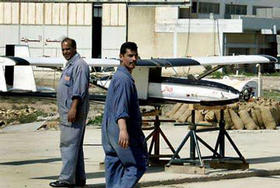 There had been a lot of furor about a supposed drone, capable of spraying biological or chemical weapons over U.S. troops, which was discovered in Iraq recently, and which Hans Blix didn't mention in his U.N. report, but burried in a big written report. Sounded like a smoking gun, and Colin Powell presented it as being very dangerous. But here you see it on the picture. It is essentially a large model airplane, which is controlled by somebody on the ground who has it within visual range. Meaning, it wouldn't be able to move more than a couple of kilometers away. And it doesn't exactly have room for any fancy weapons. Another embarrassing non-story. Story here There had been a lot of furor about a supposed drone, capable of spraying biological or chemical weapons over U.S. troops, which was discovered in Iraq recently, and which Hans Blix didn't mention in his U.N. report, but burried in a big written report. Sounded like a smoking gun, and Colin Powell presented it as being very dangerous. But here you see it on the picture. It is essentially a large model airplane, which is controlled by somebody on the ground who has it within visual range. Meaning, it wouldn't be able to move more than a couple of kilometers away. And it doesn't exactly have room for any fancy weapons. Another embarrassing non-story. Story here
[ News | 2003-03-12 23:59 | | PermaLink ] More >
|
|
| Tuesday, March 11, 2003 |  |
|
|
|
New scientific data is apparently indicating that the universe might finite and shaped like a doughnut, says a New York Times article. If you remember old computer games like Spacewar or Asteroids where, if one moves off the screen in one side, you come back from the other side. That's what would happen if the universe is finite and curved in one or more dimensions. And topologists would argue that finite spaces are more simple and easy to create than infinite spaces, so they're more likely shapes for the universe.The simplest of these compact universes is something called a 3-torus, a doughnut wrapped in three different dimensions. This object is essentially impossible to visualize: it is the equivalent, in a way, of a cube whose opposite sides are somehow glued together. In two dimensions it works just like the Spacewar screen.
Living in such a universe would be like being inside a hall of mirrors, Dr. Tegmark said. Instead of seeing new stars deeper and deeper in space, you see the same things over and over again as light travels out one side of your cube and back in the other. The finite universe model would do away with some of the troublesome and depressing aspects of the prevalent Big Bang inflation theory, which seemed to expect that everything would end up being terribly far from everything. Which just doesn't seem right.
[ Science | 2003-03-11 23:59 | | PermaLink ] More >
|
|
|
|
Interview with John Perry Barlow, cyber-rights activist, about the dangerous attempts of introducting Digital Rights Management. DRM is a euphemism for letting big corporations control everything about how you use media, even on your own computer, VCR, phone or whatever. It is being spearheaded by Microsoft, Intel, and the big media companies. Barlow speaks more intelligently and eloquently about these things than anybody I know. It is something that affects everybody, and isn't just a techie thing you don't have to pay attention to if you aren't a techie."There are three things at stake. The first is, extending a monopoly to a few large organizations about what people can or cannot know and express. This is really about the control of information and it has the potential to become over time a kind of private totalitarianism. That is not an exaggeration since it has already happened in the United States. The reason that the U.S. is behaving in the completely irrational and dangerous way that it is, is because we have erected private totalitarianism and are suffering a reality distortion field that is as dangerous as the one erupted in Germany in the 1930s. But not being driven by the government, but being driven by the media. Being driven by ourselves. I fear erecting a system which highly advantages a very few corporate channels for human intellectual exchange.
Secondly, I fear that Digital Rights Management today is Political Rights Management tomorrow. That embedding these kinds of technological controls into the very architecture of computing has the capacity to become a form of political control in the not so distant future. Because you're putting at a very basic level surveillance capacity, control over what information may or may not travel, and a whole range of things in the architecture that can be very easily used to suppress dissent.
Third, I am very afraid, that by wrapping a large amount of human knowledge up into bottles that can no longer be opened except at a price, much of it will be wrapped up in crypto bottles that in a very fairly short time cannot be opened even at a price. A huge amount of human creativity will simply be lost for future generations." Go and support the Electronic Frontier Foundation, the most effecive organization working against this stuff.
[ Knowledge | 2003-03-11 23:59 | | PermaLink ] More >
|
|
| Monday, March 10, 2003 |  |
|
|
|
 Dee Hock sent a fascinating e-mail to Joi Ito, commenting on emergent democracy, blogging, power and other interesting things. Dee Hock is the father of chaordic thinking, and the guy who created the VISA organization. And this is delightfully subversive stuff. Dee Hock sent a fascinating e-mail to Joi Ito, commenting on emergent democracy, blogging, power and other interesting things. Dee Hock is the father of chaordic thinking, and the guy who created the VISA organization. And this is delightfully subversive stuff." It is futile to directly challenge such institutions, political or commercial, for they have an oligopoly on power, money and instruments of compulsion. Nor do they hesitate to use them if threatened. However, they will prove to be vulnerable, rusted out hulks if confronted with new and better ideas of organization which transcend and enfold them. Ideas that excite the very people they expect to remain passive. What they cannot resist is the searchlight of informed public opinion. Once the public begins to withdraw relevance from them they are helpless, as Gandhi so ably demonstrated in India. While I don't begin to understand Blogging, your paper set something turning in the back of my mind that whispers it may be one of the keys to the puzzle.
I wonder if you realize that a dozen or two people like yourself with the right combination of communication, technological and organizational skills could design and implement a global government without the consent of any present form of organization and provide it with the neural network to insure its success. A government that could continually evolve to ensure that no matter affecting the public good or the health of the planet fails to be disclosed, examined and understood. Or that any existing organization could escape being confronted with synthesized opinions and alternatives that would swiftly emerge. Such an organization based on rights of participation and withdrawal and consent of the participants could be something entirely new in this tired world. Now that would be something truly worthy of the best within us and the best among us." He's not talking about a traditional government, you know, that wields power over people. What he's saying is that a few dozen dedicated people with fairly modest funding could change everything, by setting up a system that analyzes and understands all matters and activities important to society, and shares the information openly and widely, so that people can make informed decisions by themselves, based on the truth. He's right. Everything would change. I think that is an extremely profound vision and observation, and a very worthy goal.
[ Organization | 2003-03-10 18:02 | | PermaLink ] More >
|
|
|
|
 Cool pictures of snow crystals. Thanks Seb. And Michael Wilson found this site about how snow crystals are formed. Cool pictures of snow crystals. Thanks Seb. And Michael Wilson found this site about how snow crystals are formed.
[ Nature | 2003-03-10 18:33 | | PermaLink ] More >
|
|
|
|
Ton Zijlstra says a lot of good stuff about knowledge sharing and blogs, like here and here."Sharing knowledge is where a storyteller recounts a story that is particularly relevant to the listener at this time, otherwise it would fall on deaf ears, and no sharing would take place, only broadcasting. Knowledge sharing takes place in dialogues, wether in real time or not, where all parties take on the role of both story teller and listener. In practice this is not often a clear cut case: I acquire knowledge by listening to different storytellers, with knowledge sharing moments on parts of the eventually obtained knowledge. Knowledge sharing is sort of information bartering.
From any piece of knowledge I cannot describe who shared it with me: it is the resulting amalgam of all information inputs on a certain subject, of listening to multiple storytellers. Sometimes I can name influential sources, sometimes I cannot. Learning is mostly a voyage of discovery, a journey of listening, where only in the end, not along the way, I might have something to say on what brought me to my goal. It is an evolutionary process, with no clear view of what will be the red thread and what will be dead-end sideroads at the start. What can help me along on my road of discovery is relationships, storytellers who can point to other storytellers." Also, look at the KnowledgeSharing wiki page started by Denham Grey.
[ Organization | 2003-03-10 19:07 | | PermaLink ] More >
|
|
|
|
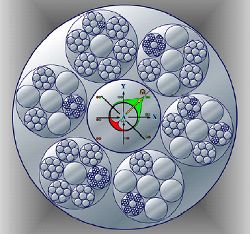 Timothy Wilken writes in Dymaxion: Doing More with Less: Timothy Wilken writes in Dymaxion: Doing More with Less:"When we examine the biological needs of a number of single celled organisms surviving as individuals versus the needs of the same number of cells working together within the body of an organism, we find the cells working together are able to reduce their biological needs by 100 to 1000 times. The bodies of all living systems are organized synergically. That means the cells work together and solve the problems of survival as a unified team. Imagine, what could be possible if the entire human species were a single organization. The synergic strategies of Ortegrity could be used to organize all of humanity into a single level 12 Ortegrity up to a limit of 13,841,287,201 humans. In our present world, with its obsession with growth and growing larger, whenever I have presented the Ortegrity to business people, they have been excited by the possibility of increasing production. However, they tend to overlook the point that these systems could be 100 to 1000 times more efficient. Now being more productive doesn't mean you have to produce more. It also means you could produce what you need in less time and then have more time for yourself and your family. Being more efficient means you can do with a lot more with less energy and matter. ...What this efficiency means is that the ecological footprint of 6 billion synergically organized humans could be as low as that of 60 million to 6 million of today's adversary-neutrally dis-organized humans." I believe that. Of course we need to be organized synergetically. And, for that matter, I don't think we inherently need to have ANY footprint. The rest of nature recycles everything. Timothy is inspired very much by Bucky Fuller and Alfred Korzybski, who are two of my heroes as well. There's a whole book in that Ortegrity link, with lots of neat stuff. "Ortegrity" refers to a way of organizing, supposedly scalable to the size of humanity. I don't quite understand it, even after looking over the document. And, well, despite that I agree in the aim of helping humanity self-organize in a synergetic way, I'm very skeptical of any scheme that involves numbers that are too neat. You know, people work together in group of so-and-so many, that are part of bigger structures with so-and-so many elements. And I'm skeptical of the intention to avoid conflict. There is productive conflict and unproductive conflict. Personally I enjoy having a good argument once in a while, and I think more gets done if there's a healthy element of competition. Synergy doesn't mean lack of conflict in my book.
[ Organization | 2003-03-10 21:52 | | PermaLink ] More >
|
|
|
|
 Unbelievable. Even George Bush the elder is apparently taking issue with his son's actions. Read this article about George Bush Sr giving a speech at Tufts University in Massachussetts. Unbelievable. Even George Bush the elder is apparently taking issue with his son's actions. Read this article about George Bush Sr giving a speech at Tufts University in Massachussetts.The first President Bush has told his son that hopes of peace in the Middle East would be ruined if a war with Iraq were not backed by international unity.
Drawing on his own experiences before and after the 1991 Gulf War, Mr Bush Sr said that the brief flowering of hope for Arab-Israeli relations a decade ago would never have happened if America had ignored the will of the United Nations. [...]
The former President’s comments reflect unease among the Bush family and its entourage at the way that George W. Bush is ignoring international opinion and overriding the institutions that his father sought to uphold. Mr Bush Sr is a former US Ambassador to the UN and comes from a family steeped in multi-lateralist traditions. Let me say it again. However many faults the previous U.S. presidents have had, they've largely acted coolly and presidentally in their foreign policies, even if they didn't in their personal lives. Bush Jr. is more like a regular dysfunctional guy, a spoiled rich kid, coke-head, dry drunk, mood swinging, vengeful, angry, learning about the world by sitting in his underwear watching TV, and acting as if he somehow won the whole thing in the lottery.
[ Politics | 2003-03-10 22:13 | | PermaLink ] More >
|
|
|
|
Another tidbit from the Japan Media Review article "A New Set of Social Rules for a Newly Wireless Society", written by Mizuko Ito, Joi Ito's sister:"One college student I spoke to described leaving one's phone at home or letting the battery die as "the new taboo." Teens and twentysomethings usually do not bother to set a time and place for their meetings. They exchange as many as 5 to 15 messages throughout the day that progressively narrows in on a time and place, two points eventually converging in a coordinated dance through the urban jungle. To not have a keitai [cellphone] is to be walking blind, disconnected from just-in-time information on where and when you are in the social networks of time and place."
[ Culture | 2003-03-10 22:51 | | PermaLink ] More >
|
|
| Sunday, March 9, 2003 |  |
|
|
|
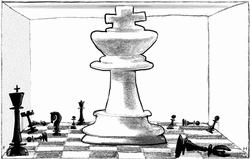 Nice article from Jimmy Carter in the New York Times. (A brief registration is required to access it). Carter is a good man and an intelligent man - somebody worthy of running a country. These days, like Clinton, he's somewhat breaking the unwritten rule for ex-presidents, of not commenting on or critisizing the current administration. But the U.S. has never had an administration like this one, so apparently willing to pour it all down the drain. Nice article from Jimmy Carter in the New York Times. (A brief registration is required to access it). Carter is a good man and an intelligent man - somebody worthy of running a country. These days, like Clinton, he's somewhat breaking the unwritten rule for ex-presidents, of not commenting on or critisizing the current administration. But the U.S. has never had an administration like this one, so apparently willing to pour it all down the drain."Profound changes have been taking place in American foreign policy, reversing consistent bipartisan commitments that for more than two centuries have earned our nation greatness. These commitments have been predicated on basic religious principles, respect for international law, and alliances that resulted in wise decisions and mutual restraint. Our apparent determination to launch a war against Iraq, without international support, is a violation of these premises." He goes on to explain criteria for having a "just" war.- The war can be waged only as a last resort, with all nonviolent options exhausted.
- The war's weapons must discriminate between combatants and noncombatants.
- Its violence must be proportional to the injury we have suffered.
- The attackers must have legitimate authority sanctioned by the society they profess to represent.
- The peace it establishes must be a clear improvement over what exists.
And he points out clearly how Bush's war is something totally different from what has happened in the past. The choice of initiating military action is something past American presidents have sweated over, that has kept them up at night, discussing all the possibilities, making sure it is the best thing to do. Despite their flaws, they have always been people with integrity and restraint. But now war appears to be something you plan in advance, and then you go and try to sell people on it, by making up reasons if necessary.
[ Politics | 2003-03-09 13:29 | | PermaLink ] More >
|
|
|
|
 Another item in a long list of fake evidence and proof synthesized from newspaper articles, used to justify war. From Washington Post: Another item in a long list of fake evidence and proof synthesized from newspaper articles, used to justify war. From Washington Post:A key piece of evidence linking Iraq to a nuclear weapons program appears to have been fabricated, the United Nations' chief nuclear inspector said yesterday in a report that called into question U.S. and British claims about Iraq's secret nuclear ambitions.
Documents that purportedly showed Iraqi officials shopping for uranium in Africa two years ago were deemed "not authentic" after careful scrutiny by U.N. and independent experts, Mohamed ElBaradei, director general of the International Atomic Energy Agency (IAEA), told the U.N. Security Council. And we're also talking about those aluminum tubes, which Colin Powell says are for use in enriching uranium for nuclear weapons. Doesn't match with the facts, as they aren't suited for that purpose, and it is well documented how Iraq is using them to make ordinary rockets.
[ Politics | 2003-03-09 13:46 | | PermaLink ] More >
|
|
|
|
Sorry about all the war stuff, but it is encouraging that there is an increasing amount of excellent coverage in the mainstream U.S. media. Like a couple of Op-Ed pieces in the New York Times, such as Saying No to War:"Given the corner Mr. Bush has painted himself in, withdrawing troops — even if a considerable slice remains behind — would be an admission of failure. He obviously intends to go ahead, and bet on the very good chance that the Iraqi army will fall quickly. The fact that the United Nations might be irreparably weakened would not much bother his conservative political base at home, nor would the outcry abroad. But in the long run, this country needs a strong international body to keep the peace and defuse tension in a dozen different potential crisis points around the world. It needs the support of its allies, particularly embattled states like Pakistan, to fight the war on terror. And it needs to demonstrate by example that there are certain rules that everybody has to follow, one of the most important of which is that you do not invade another country for any but the most compelling of reasons. When the purpose is fuzzy, or based on questionable propositions, it's time to stop and look for other, less extreme means to achieve your goals." and The Xanax Cowboy:"Bush officials believe that making the world more scared of us is the best way to make us safer and less scared. So they want a spectacular show of American invincibility to make the wicked and the wayward think twice before crossing us.
Of course, our plan to sack Saddam has not cowed the North Koreans and Iranians, who are scrambling to get nukes to cow us.
It still confuses many Americans that, in a world full of vicious slimeballs, we're about to bomb one that didn't attack us on 9/11 (like Osama); that isn't intercepting our planes (like North Korea); that isn't financing Al Qaeda (like Saudi Arabia); that isn't home to Osama and his lieutenants (like Pakistan); that isn't a host body for terrorists (like Iran, Lebanon and Syria).
I think the president is genuinely obsessed with protecting Americans and believes that smoking Saddam will reduce the chances of Islamic terrorists' snatching catastrophic weapons. That is why no cost — shattering the U.N., NATO, the European alliance, Tony Blair's career and the U.S. budget — is too high."
[ Politics | 2003-03-09 17:46 | | PermaLink ] More >
|
|
|
|
 One of my favorite places to go for a walk is along Mulholland Drive. Mulholland runs along the ridge of the Santa Monica Mountains separating the Los Angeles basin from the San Fernando Valley, where I live. So, you're in the middle of the metropolis, but can still be in what is pretty much a wilderness. And most people stay down there in the smog, so you can even sometimes walk for a little bit without meeting anybody else. These pictures are some I took today. This one is pointed South, towards L.A. One of my favorite places to go for a walk is along Mulholland Drive. Mulholland runs along the ridge of the Santa Monica Mountains separating the Los Angeles basin from the San Fernando Valley, where I live. So, you're in the middle of the metropolis, but can still be in what is pretty much a wilderness. And most people stay down there in the smog, so you can even sometimes walk for a little bit without meeting anybody else. These pictures are some I took today. This one is pointed South, towards L.A.
[ Diary | 2003-03-09 19:02 | | PermaLink ] More >
|
|
| Saturday, March 8, 2003 |  |
|
|
|
 New functional kinds of democracy is one of my primary interests. How can groups of people work out how to organize themselves and act collectively, in a way that serves all the present needs, rather than just serving the lead of an elite, elected or not. Tom Atlee is somebody who has gathered more resources in that field than anybody else I know. This document, which is a couple of years old, is a call for a movement to arise, a movement towards a new kind of democracy. It is based on a series of assumptions, which I for one share wholeheartedly: New functional kinds of democracy is one of my primary interests. How can groups of people work out how to organize themselves and act collectively, in a way that serves all the present needs, rather than just serving the lead of an elite, elected or not. Tom Atlee is somebody who has gathered more resources in that field than anybody else I know. This document, which is a couple of years old, is a call for a movement to arise, a movement towards a new kind of democracy. It is based on a series of assumptions, which I for one share wholeheartedly:1) Differences are a resource for the generation of wisdom, solutions and possibilities.
2) Tapping the richness of diversity requires good attention to process.
3) People who care about something are a special resource for handling it.
4) Properly facilitated dialogue among diverse stakeholders can produce understandings and programs on which they can all agree.
5) A small group (1-5 dozen people) who have been selected (randomly or scientifically; not politically) to represent the diversity of a larger population can, through appropriately facilitated deliberation, generate real wisdom about complex issues on behalf of that larger population.
6) Those who will be affected by a decision should be able to play an informed and appropriate role in shaping that decision.
7) The systems we live in (cultures, institutions, media, power relations, infrastructures, etc.) are among the most profound influences on our consciousness and behavior. Efforts to change a society's consciousness and behavior require changes in systems.
8) The political and governmental systems we have now are not working. In fact, they play a significant role in generating our growing collective problems (even catastrophes).
9) Any positive evolution of democracy will be grounded in collaboration, our common humanity, respect for diversity, and/or our understanding of holism and living systems theory.
10) Such evolution of democracy is of the highest importance. Without it, our circumstances will likely grow increasingly dire. With it, every other public issue will be more readily resolved. This is where the leverage is. And Tom continues by suggesting it will take some movement building action by people who share those assumptions, in the form of gatherings, websites, journals, books, study circles, networking and financing.
[ Organization | 2003-03-08 21:33 | | PermaLink ] More >
|
|
|
|
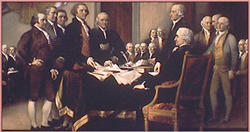 Joi Ito has an emergent democracy brainstorm with John Vasconcellos and friends. Joi Ito has an emergent democracy brainstorm with John Vasconcellos and friends."The discussion was quite fascinating. We started talking about the republic and representative democracy. It was pointed out (sorry, I took notes, but not always about who said what....) that the republic was not formed for the sake of efficiency but out of a more elitist attitude that certain people were more fit to govern and that it would be impossible for an uneducated mob to rule. In that sense, it really wasn't just a more efficient democracy. I asked John what he thought about the current representative democracy and he said, 'not functioning well, but functioning barely'. He said the people are 'so busy, distracted and spoiled'. I agreed with them that a direct democracy in our current environment was not feasible, but that maybe our thoughts on emergent democracy might, in the short term, be a great tool for supporting a the 'not functioning well, but functioning barely' representative democracy that we have today." Very interesting point there about representative democracy in the form of a republic, like in the U.S. It isn't to allow the people to decide. It is to remove the mob from deciding. However brilliant and freedom minded the fathers of the U.S. Constitution were, it wasn't direct democracy they had in mind. So, it is time for something altogether new.
[ Organization | 2003-03-08 22:25 | | PermaLink ] More >
|
|
|
|
 Here is a map of the population density on Earth. I like maps like that. I notice there's tons of space with nobody there. Because we've already turned those places into deserts mostly. And some places with a huge concentration of people. Mikel Maron says: Here is a map of the population density on Earth. I like maps like that. I notice there's tons of space with nobody there. Because we've already turned those places into deserts mostly. And some places with a huge concentration of people. Mikel Maron says:" It would be so cool to see this animated, over time. Watch the population explode and recede, like colored waves of bacteria, over centuries. This would work well for other data sets -- like the spread of memes over the world. This is something I'm tooling with -- weblogs.com + ICBM + RSS + Flash!" Yes, that would be very cool. There are lots of things I'd love to see in near real-time on a map, or a globe. I'd like to be able to play with different data sets. Resource use, money flows, health, education, net traffic, the people I know, etc.
[ Patterns | 2003-03-08 23:41 | | PermaLink ] More >
|
|
| Friday, March 7, 2003 |  |
|
|
|
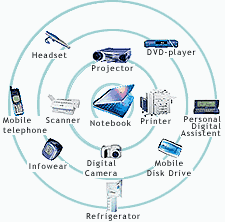 Bluetooth seems to be becoming a really cool thing. Even though I haven't succeeded in getting very far with it myself. For the uninitiated, Bluetooth is a standard that allows cellphones, headsets, handhelds, laptops, or whatever, to communicate wirelessly with each other over short distances, like when they're within the same room. I've got a Nokia 6310i phone with bluetooth and GPRS (for always-on Internet kind of stuff) and a Palm handheld with a bluetooth card. The idea was that the Palm would use the phone (while still in my pocket) for Internet connection, and be able to run ICQ instant messaging all the time. Well, I succeeded in making that work only once or twice, for a short period of time. The phone seems to have trouble connecting and disconnects often. It seems like other owners of the 6310i have similar problems, and I probably should have chosen the Sony Ericsson T68, which was what my cell provider actually recommended, and which apparently does bluetooth beautifully. The bluetooth adapter for my Palm m505 is kind of fragile the way it sticks out, so it wouldn't really be practical to leave it plugged in in my pocket. And I just had to have the Palm serviced because the connector for the little bluetooth card no longer held it in. And even when I got the connection to work, I realized quickly that my Palm organizer shut off after two minutes or so, breaking the connection, so there was no way I could keep ICQ running. Anyway, others are having more fun. Bluetooth seems to be becoming a really cool thing. Even though I haven't succeeded in getting very far with it myself. For the uninitiated, Bluetooth is a standard that allows cellphones, headsets, handhelds, laptops, or whatever, to communicate wirelessly with each other over short distances, like when they're within the same room. I've got a Nokia 6310i phone with bluetooth and GPRS (for always-on Internet kind of stuff) and a Palm handheld with a bluetooth card. The idea was that the Palm would use the phone (while still in my pocket) for Internet connection, and be able to run ICQ instant messaging all the time. Well, I succeeded in making that work only once or twice, for a short period of time. The phone seems to have trouble connecting and disconnects often. It seems like other owners of the 6310i have similar problems, and I probably should have chosen the Sony Ericsson T68, which was what my cell provider actually recommended, and which apparently does bluetooth beautifully. The bluetooth adapter for my Palm m505 is kind of fragile the way it sticks out, so it wouldn't really be practical to leave it plugged in in my pocket. And I just had to have the Palm serviced because the connector for the little bluetooth card no longer held it in. And even when I got the connection to work, I realized quickly that my Palm organizer shut off after two minutes or so, breaking the connection, so there was no way I could keep ICQ running. Anyway, others are having more fun.
A Swedish programmer came up with a way of using his cellphone for remote controlling his Macintosh. The latest Mac laptops come with built-in bluetooth, and it apparently talks beautifully with Sony Ericsson phones. So this guy made a program that allows you to start and stop music on the Mac. And other people are coming up with new scripts. Like, the Mac can know when you walk into the room, and can start picking up your e-mail, and that kind of thing.
And for those of you who've actually played with bluetooth connections, and noticed that all the cellphone and computer really found in the local wireless area was each other, this from BoingBoing is cool:"I am in Levi, Finland, at a meeting where we are talking and playing and working wireless. I pull out my laptop, fire up the bluetooth manager to connect with my cell phone to dial up a connection and ... whoa ... is this slooooow ... where *did* the connection go ... and just when I am about to give up I see hundreds of bluetooth devices on my laptop's bluetooth manager! Headsets, phones, devices, all revealing themselves in low security mode. It's a shock, as I can hardly believe my eyes. Like looking at a Windows Networking window at a LAN party or conference, but these are phones and devices and laptops aplenty. Later I try it in my room and the same thing happens, with a few less connections but the same effect..." It is a couple of years since I was in Helsinki, but it certainly was cellphone central with everybody being glued to a Nokia phone.
[ Technology | 2003-03-07 11:20 | | PermaLink ] More >
|
|
|
|
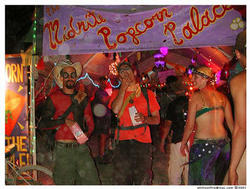 Timothy Wilken mentions "GIFTING IT: A Burning Embrace of Gift Economy", a documentary by Renea Roberts about the gift economy at work in the annual Burning Man festival. I haven't never made it to Burning Man so far. Usually I remember about it too late to make plans. But I've been well aware how it in many ways presents a model for a new and better way of organizing society. You know, creative people think of what they feel ought to be added to the soup. What is needed, or what would be cool. They collaborate on making it happen. It is usually a gift to the whole. And it is wild and exciting, and it blows your mind. Or it is a little thing that is there when you need it. An elaborate infrastructure emerges in the middle of a barren desert. It is peaceful. It is an experience. It has the most marvelous diversity, woven into a common fabric. It all gets cleaned up when it is done, and it doesn't leave a trace. Many documentaries have been made about Burning Man, but this is apparently the first that focuses on the gift economy. On how the openness and the connection with others is what makes it work. Timothy Wilken mentions "GIFTING IT: A Burning Embrace of Gift Economy", a documentary by Renea Roberts about the gift economy at work in the annual Burning Man festival. I haven't never made it to Burning Man so far. Usually I remember about it too late to make plans. But I've been well aware how it in many ways presents a model for a new and better way of organizing society. You know, creative people think of what they feel ought to be added to the soup. What is needed, or what would be cool. They collaborate on making it happen. It is usually a gift to the whole. And it is wild and exciting, and it blows your mind. Or it is a little thing that is there when you need it. An elaborate infrastructure emerges in the middle of a barren desert. It is peaceful. It is an experience. It has the most marvelous diversity, woven into a common fabric. It all gets cleaned up when it is done, and it doesn't leave a trace. Many documentaries have been made about Burning Man, but this is apparently the first that focuses on the gift economy. On how the openness and the connection with others is what makes it work.
[ Culture | 2003-03-07 16:51 | | PermaLink ] More >
|
|
|
|
SmartMobs mentions a paper on Integrating and Evolving a Mob: The Growth of a Smart Mob into a Wireless Community of Practice. It is a case study based on activities organized via HipTop NationBased on experiences with Hiptop Nation, it appears that by having ubiquitous mobile data communication devices and a successful communal blog, it is possible to create an ideal environment within which a smart mob can grow into a goal-oriented mobile community of practice. Communal blogs play a critical role in the creation of three essential elements of community: the establishment of social capital, the creation of weak ties that foster creativity, and the formation of a sense of “place” within which everything can happen. (3, 4, 5). The final crucial ingredient is a complex goal.
In these special circumstances, a smart mob can not only quickly change into a mobile community of practice, but once its goals have been achieved it can just as quickly “dissolve” back into a smart mob. This is metaphorically similar to the way certain liquid solutions can quickly crystallize, dissolve back into liquid, and then recrystallize based on external influences. By adding an external influence, namely a specific shared goal, one can “precipitate” the crystallization of these smart mobs into powerful mobile communities of practice. After the goals have been achieved, during which participants have gained expertise in their particular domains, the group can dissolve back into a smart mob and be ready to rapidly recrystallize whenever new goals are introduced.
The increasing popularity of communal blogs, coupled with more sophisticated ubiquitous mobile communication devices (9, 10, 11), will most likely make this interesting social phenomenon more common in the future. A future opportunity will be the deliberate cultivation of this phenomenon, as it has the ability to create incredibly effective and creative goal-oriented teams of mobile individuals. I like the crystalization and dissolution thing. And, yes, blogs and mobile data devices and a shared goal are good pre-conditions for ad hoc organization to happen.
[ Culture | 2003-03-07 18:22 | 0 comments | PermaLink ]
|
|
|
|
 I was just watching an interview with Christopher Walken on the Charlie Rose Show. He mentioned that the way he studies a script to prepare for a movie is as follows: He lays out all the pages in front of him in his kitchen and then he goes through them backwards, reading only his own lines, not looking at the other people's lines at all. Then he tries doing the lines in different voices, like as Elvis or as a U-boat commander, etc., still backwards. He does that until he finds the rhythm of it all, and it feels natural. He doesn't pay attention to the story. And when it feels right, and he senses the rhythm, then he goes and shows up on the set. And somehow, magically, his interpretation of the character always fits. But at the same time it always comes from an unexpected and unpredictable, possibly unnerving and unsettling, but always delightful place. ...Hm, I seem to find some deep wisdom there, that applies to many other things in life. Don't just try to fit in and do what is expected and required of you. Go and find your own true rhythm, and when you really feel it, come in and discover that, miraculously, it fits perfectly with everybody else's rhythms, and together we manifest something wonderful that has never before been seen. I was just watching an interview with Christopher Walken on the Charlie Rose Show. He mentioned that the way he studies a script to prepare for a movie is as follows: He lays out all the pages in front of him in his kitchen and then he goes through them backwards, reading only his own lines, not looking at the other people's lines at all. Then he tries doing the lines in different voices, like as Elvis or as a U-boat commander, etc., still backwards. He does that until he finds the rhythm of it all, and it feels natural. He doesn't pay attention to the story. And when it feels right, and he senses the rhythm, then he goes and shows up on the set. And somehow, magically, his interpretation of the character always fits. But at the same time it always comes from an unexpected and unpredictable, possibly unnerving and unsettling, but always delightful place. ...Hm, I seem to find some deep wisdom there, that applies to many other things in life. Don't just try to fit in and do what is expected and required of you. Go and find your own true rhythm, and when you really feel it, come in and discover that, miraculously, it fits perfectly with everybody else's rhythms, and together we manifest something wonderful that has never before been seen.
[ Inspiration | 2003-03-07 19:42 | | PermaLink ] More >
|
|
| Thursday, March 6, 2003 |  |
|
|
|
David Weinberger and Doc Searls have written an article about what the Internet is and what it isn't. It presents some powerful and simple points that need to be spelled out in neon, for all those who don't quite get it. Maybe not you and I, but maybe the phone company and the recording industry and the government. And you're hearing it from two of the four authors of the Cluetrain Manifesto."All we need to do is pay attention to what the Internet really is. It's not hard. The Net isn't rocket science. It isn't even 6th grade science fair, when you get right down to it. We can end the tragedy of Repetitive Mistake Syndrome in our lifetimes — and save a few trillion dollars’ worth of dumb decisions — if we can just remember one simple fact: the Net is a world of ends. You're at one end, and everybody and everything else are at the other ends.
Sure, that’s a feel-good statement about everyone having value on the Net, etc. But it’s also the basic rock-solid fact about the Net's technical architecture. And the Internet’s value is founded in its technical architecture.
Fortunately, the true nature of Internet isn’t hard to understand. In fact, just a fistful of statements stands between Repetitive Mistake Syndrome and Enlightenment ..."
[ Organization | 2003-03-06 23:59 | | PermaLink ] More >
|
|
|
|
Andrius Kulikauskas is a champion for working openly. Read his new bigger and bolder proposal for the operation of the Minciu Sodas laboratory. The idea is to publically propose projects, to make clear which people are available, what they're available for, and how much money is needed. Because it is all public, and because people can follow the progress, anybody can provide information and leads that might make projects come together. He outlines a scheme with a range of bigger and smaller projects supporting each other. Oh, and I'm delighted to see a slot waiting for me there. Yes, of course I'd enjoy making knowledge management systems with such distinguished folks.
[ Organization | 2003-03-06 23:59 | | PermaLink ] More >
|
|
|
|
Joi Ito:"Had dinner tonight with Lawrence Lessig to talk about emergent democracy and other things. Larry pointed out some interesting work called deliberative polling being done by Professor James S. Fishkin. Since polling is forces people to vote on something they don't really know too much, the data may be statistically accurate, but is not necessarily the best way to promote a democratic system. deliberative polling takes a diverse group of people, forces them to discuss the issues in small group, in large groups, small groups, over and over again for a fairly lengthy process until everyone has a pretty good idea of the issues and an balanced and eductated position. Polls are conducted through the process to track how people's opinions change. Afterwards, many of the people who have participated become much more active citizens. I think that this is similar to the emergent democracy idea that we have. Maybe we can try to do this deliberative polling using the online tools that we have." Hm, interesting. Makes me think of Citizen Deliberative Councils. And wasn't it the Roman senate that picked regular citizens for its members on a rotating basis, whether they wanted to or not? There's something to say for bringing together a random cross-section of people, and hearing what they come up with, once they study the issues at hand. As opposed to career politicians and lobbyists trying to decide everything."Deliberative polling turns to the representatives to execute on these opinions. Antoin was the first to point out (many others have pointed this out later) that my paper misses an important part of the democratic process. The execution. It focuses on the deliberation part. Maybe emergent democracy should focus on those interesting moments in history where the people wake up and change government. Larry talked about how there were three such instances in the US. When the framers went against the bill of rights in writing the constitution, during the civil war and during the "new deal." Each of these involved a deviance from constitutional democracy because of a huge swell in the opinion of the people. Maybe emergent democracy enables the people to force an issue when it become important enough to engage the public to rise up. Sort of an information militia. We can rely on the experts in the representative democracy when this are running smoothly and the people are not engaged... Anyway, still very malformed thoughts, but a lot to think about." Yes, of course, the action. There's something screwed up about deciding things in a disconnect from the action required to do it. That's again often what politicians do. Maybe real democracy is inextricably intertwined with action. Maybe it is what people choose to DO, if they're free to do so.
[ Organization | 2003-03-06 23:59 | | PermaLink ] More >
|
|
|
|
John Robb mentions an article "The Pentagon's New Map" by Thomas Barnett, a military strategist from the U.S. Naval War College. It purportedly explains "why we're going to war, and why we'll keep going to war". But what is interesting about it is that it is based on a fairly lucid analysis of how it is *disconnection* that gives birth to the dangers of terrorism and rogue states, etc. Which I fully agree with. It is the fact that some nations and some groups of people are disconnected from the rest of us, that is likely to lead to them feeling disadvantaged and resentful, to the degree that they're likely to strike back. If we were all intertwined in a unified globalized structure, in terms of economics, communication, technology, democracy, etc., there would be no basis for war. So that would be the target.
So far so good. But to a hammer everything is a nail. To Mr. Barnett, being a military strategist, the means of getting there is by going to war. That begins to sound rather insane. Achieve a unified, open, prosperous, global democracy by going to war against anybody who isn't going along with the globalization thing. But I wouldn't be too surprised if that is actually the strategy the people who're running Bush are pursuing. Bomb any country that doesn't have McDonalds franchises. It has hardly anything to do with whether those countries are a military threat to the United States. It has all to do with whether they're willing to play by our rules or not. Which involves giving multi-national corporations free reign, and refraining from acting as an independent state. There's a certain twisted logic there.
[ Politics | 2003-03-06 23:59 | | PermaLink ] More >
|
|
|
|

Japanese teenagers seem to be a continuing source of strange and interesting trends. Here's a page about the trendy Ganguro Girls of Tokyo. The GANGURO "look" is to have dyed blonde or brown hair, plucked eyebrows, tan skin, mini-skirt, cool shoes, "ganguro gal" are the brownskin girls, "gonguro gal" are the more deep brownskin, "Yamanba gal" is silver or white or brown hair, brown or hard-drawn face, heavy makeup or panda makeup. "Yamanba gal" include "Ganguro gal" and "Gonguro gal".
[ Culture | 2003-03-06 23:59 | | PermaLink ] More >
|
|
| Wednesday, March 5, 2003 |  |
|
|
|
Britt Blaser posts some well-balanced thoughts about empowered dialogue in regards to war or no war."In the fall of 1967, I was flying C-130s in Viet Nam and my fiancée was marching for peace in Washington. We didn't see that as a conflict—more like covering both sides of the story. Nor did we feel any tension around this. I was there because I was expected to be there, and, having been born in 1942, I had grown up with the expectation of military service. She marched because our generation was working out a new voice and that view had to be sent to the politicians." Indeed, it is not as simple as a for or against, and that everybody is just one or the other. It is vital to examine all sides. Preferably to step into the shoes of all sides. Personally I'm not even particularly a pacifist, in the sense of refusing all uses of violence. Sometimes it is the best solution to kill people. If you threaten me and my family enough with physical harm, and I don't see any other solution, I'd kill you too. But violence and death is a very real and serious matter. The people you kill will be dead. The people you didn't quite succeed in killing, or that were just accidentally standing too close to the action, they will be messed up. They'll have missing body parts, and they'll have lost people they loved. Their husbands and wives and children and parents. It is very ugly. It isn't just something you can decide remotely, to make a political statement. Anyway, Britt is somebody who's experienced war first hand, who's been shot at, shot down in a plane, who's pals have been killed, so I certainly pay attention to his angles on this. Anyway, one of the main points Britt is making here, which could lead to uncomfortable conclusions is along the lines of:"If we don't occupy Iraq now, the body count goes up—not because that's where the terrorists are, but because we will not have been forceful enough to do so and silence the Arab machismo affect." The idea being that there are terrorists out there. They'll kill people if they can get away with it. But it is more like a street fight than a war. But that it is necessary to send a signal of strength, or the other parties will exploit our weakness. Hm, I can see that, but at the same time I don't agree. I think that the people we're dealing with, in the Middle East, and the groups we're concerned with as sources of terrorism, I think they certainly respect strength. They might be likely to respect displays of power more than they respect talk. But at the same time they feel morally obliged to revenge and pay back injustices believed to be carried out against their people, whatever definition they have of what 'their' people are, or of what injustices are. I think that's the motivation. It isn't just because they can, and nobody's stopping them. Violence that in any way can be regarded as unjust will tend to foster more payback violence, in the form of terrorism. But strength itself doesn't necessarily create that backlash. I think the Arab machismo is a big factor, but I think the worst you can do about it is to humble it. The trick is to display unarguable strength, but not to force your opponents to lose face. If you do, they will be morally obliged to use their very last breath to try to regain their pride.
The whole thing has been handled badly in terms of diplomacy from the U.S. side. It is set up so that Bush, and his pal Blair, would lose face if they don't get their war. Because they've spent a lot of energy on talking about how they're going to bomb Iraq no matter what. So, of course, if they're forced to back down, it looks a bit stupid, and they look weak. They've played their cards very badly diplomatically. It could very well have been a useful thing to send all those soldiers and all that hardware down there to stand and look very threatening. It could have been done in a way where it would have been a victory if war didn't become necessary. Right now it would look like a loss of face, even if Hussein spontaneously disappeared altogether.
I don't think the lack of a war now would in any way increase the likelyhood of something worse happening later. On the contrary. What makes this war almost inavoidable is only the unwillingness of the side of the current U.S. administration to look weak, or to be caught being wrong. It is about proving that one is right by proceeding with the original plan, even though it was greatly bungled.
[ Politics | 2003-03-05 13:51 | | PermaLink ] More >
|
|
|
|
 According to the National Geographic Roper Geographic Survey, 87% of Americans can't find the country of Iraq on a map. That was a bit disturbing, since many of those support going to war against Iraq. Anyway, go find Iraq on a map, so you don't have to be part of those 87%. Americans ranked second to last in the international survey. 11% of the people surveyed couldn't even find their own country on a map. According to the National Geographic Roper Geographic Survey, 87% of Americans can't find the country of Iraq on a map. That was a bit disturbing, since many of those support going to war against Iraq. Anyway, go find Iraq on a map, so you don't have to be part of those 87%. Americans ranked second to last in the international survey. 11% of the people surveyed couldn't even find their own country on a map.
[ Information | 2003-03-05 14:10 | | PermaLink ] More >
|
|
|
|
It is a good idea not to forget how the last gulf war was started. Yes, Iraq invaded Kuwait, but I think a lot of people are not aware that the United States quite directly and officially had let Saddam Hussein know that he was welcome to have his way with Kuwait. In other words, it was a trap. Read more about it, and read the transcript of what the U.S. ambassador actually said.Eight days before the outbreak of the Gulf war, Saddam summoned April Glaspie, then the American ambassador to Iraq, and launched into a tirade. He railed about the pernicious role of the British in the region, reminded her that without Iraq the Iranians would not be stopped from taking over the whole region by anything short of nuclear weapons, and complained about the "economic aggression" of Kuwait and the United Arab Emirates in agitating for lower oil prices. He made it all too clear that he intended to use force to stop what he claimed were Kuwaiti incursions onto Iraqi territory in the so-called Neutral Zone. Glaspie replied that the Americans, too, had experience with "the colonialists," which indeed seems odd given that the US and these very "colonialists" would be jointly bombing the hell out of Iraq is a little over a week's time. As for the price of oil, Ms. Glaspie opined that "We have many Americans who would like to see the price go above $25 because they come from oil-producing states." At a time when the US secretary of state was none other than James Baker, a Texan who virtually personifies Big Oil, the implications of what the US Ambassador was telling Saddam were inescapable. Glaspie went on to say:
"I think I understand this. I have lived here for years. I admire your extraordinary efforts to rebuild your country. I know you need funds. We understand that and our opinion is that you should have the opportunity to rebuild your country. But we have no opinion on the Arab-Arab conflicts, like your border disagreement with Kuwait. I was in the American Embassy in Kuwait during the late 60's. The instruction we had during this period was that we should express no opinion on this issue and that the issue is not associated with America. James Baker has directed our official spokesmen to emphasize this instruction. We hope you can solve this problem using any suitable methods . . ."
[ Politics | 2003-03-05 15:16 | | PermaLink ] More >
|
|
|
|
 Fun exhibit entitled "Radebaugh - The Future We Were Promised" in Philadelphia. Article here. A.C. Radebaugh was a commercial illustrator whose works in the 30s, 40s and 50s painted a vision of a glorious tomorrow. Optimistic visions of flying cars and colonies on Mars. All the fun technology and the leisurely lifestyle we really *should* have had by now. Where is the future we were promised? Radebaugh's art is no less enjoyable today. Fun exhibit entitled "Radebaugh - The Future We Were Promised" in Philadelphia. Article here. A.C. Radebaugh was a commercial illustrator whose works in the 30s, 40s and 50s painted a vision of a glorious tomorrow. Optimistic visions of flying cars and colonies on Mars. All the fun technology and the leisurely lifestyle we really *should* have had by now. Where is the future we were promised? Radebaugh's art is no less enjoyable today.
[ Inspiration | 2003-03-05 23:59 | | PermaLink ] More >
|
|
|
|
Dean Kamen, inventor of the Segway scooter, and many other interesting things, introduced last Thursday a portable water purifier that he hopes will save millions of people around the world from shortages of fresh water. It is a 100 pound device which requires little maintenance and uses no chemicals or filters. It uses a specialized distillation and condensation process and produces 10 gallons of clean water an hour on 500 watts of electricity. The idea is that it goes hand in hand with a generator he's also developed, which uses a Stirling engine to produce electricity.
[ Technology | 2003-03-05 23:59 | | PermaLink ] More >
|
|
|
|
Nice article at Kuro5hin about the potential for profitable power from ocean waves. Harvesting hydro electric power from waves has been a tricky undertaking, but apparently progress is happening. Lots of details and references about the technology.
[ Nature | 2003-03-05 23:59 | | PermaLink ] More >
|
|
|
|

"You can live to be a hundred if you give up all the things that make you want to live to be a hundred." --Woody Allen
[ Inspiration | 2003-03-05 23:59 | | PermaLink ] More >
|
|
| Tuesday, March 4, 2003 |  |
|
|
|
 Long article from Timothy Wilken on synergetic wealth and synergetic consensus. Long article from Timothy Wilken on synergetic wealth and synergetic consensus."If we humans synergically reorganized our world, we would all be wealthy beyond our wildest dreams. Today in 2002, if we were to reclaim the gift of all the land and natural resources presently held on planet Earth as individual property. And if we were to further reclaim the gift of Progress from those few who control it today, and then divided these two gifts equally among the 6 billions of us living on the planet, we would discover to our surprise and amazement that every man, woman, and child is wealthy beyond their dreams.
With synergic organization, and careful utilization of the planet’s total wealth for the benefit of all humanity, the carrying capacity of the Earth could be maximized to solve all our human problems and meet our all our needs. And this is without any need to damage the Earth, or degrade our environment.
There would never be any need for humans to earn their livings again. Our livings have already been earned by all those humans who lived and died to give us the great gift of progess. Then all humans would be free to spend their time making their lives meaningful by creating more wealth to be gifted to living and future humanity." And I agree. There's resources enough on this planet for everybody to live affluently, if those resources weren't squandered and hoarded so much. And the resources could be used in collaboration and in harmony with the planet, rather than in the adversarial relationship that exists now. But it would require a dramatically different way of thinking about things, and a dramatically different way of organizing ourselves. Timothy also talks about what he calls 'Unanimous Rule Democracy', which is very much how I think democracy should work as well. Not rule by the majority, not rule by a dictator, not rule by whoever is first or fastest or richest, but unanimous consensus. Which is something we don't see much of in our current society."Synergic consensus is not availability to humanity today. We do not yet know how fast it will be at making decisions. But, I predict that unanimous rule democracy will prove faster than majority rule democracy. Synergic consensus elimates conflict. Recall conflict is the stuggle to avoid loss. Conflict is at the very heart of majority rule democracy. The focus of synergic consensus is very different. The entire group knows from the outset that they cannot lose. They are focused on choosing a plan of action that serves the needs of all the members in the group—to choose a plan of action that causes no one to lose. The synergic veto is not invoked capriciously. The only basis for synergic veto is to prevent someone from losing. This is a mechanism to eliminate loss—to choose the very best plan of action for everyone. This may well speed up the process of decison making. In any event regardless of the speed of decision, implimentation will be rapid. There is no conflict. This is a major advantage over majority rule democracy." I'm wondering how to demonstrate that, even on a small scale. More on that at another time.
[ Organization | 2003-03-04 17:23 | | PermaLink ] More >
|
|
|
|
An English essay written by a teenager baffled her teacher, because she couldn't decipher what it said. It was written in text messaging short-hand, like what teenagers use to message each other on cell phones, or like what is used in fast-moving chat rooms. It started like this:"My smmr hols wr CWOT. B4, we used 2go2 NY 2C my bro, his GF & thr 3 :- kids FTF. ILNY, it's a gr8 plc." Well, that is not all that hard if you're used to seeing that kind of messages. It simply says: "My summer holidays were a complete waste of time. Before, we used to go to New York to see my brother, his girlfriend and their three screaming kids face to face. I love New York. It's a great place." Teachers and parents would typically think it is a horrible thing, that kids can't read and write in normal ways, and it means that education is going down the drain. Maybe that's what it means, and maybe it is bad. But it is also worth looking at, that what is emerging is different forms of communication, that cultivate different types of skill. To read messages like those, you're not using the same linear literary and literal skills previous generations would use. Many things are happening by pattern matching. You figure things out, not by a standard interpretation, but by looking at the whole picture and guessing at what it might mean. I notice that kids today appear to have rather advanced skills in some areas that I didn't at all have when I was a kid. My 3 year old daughter seems to learn things by some kind of pattern matching osmosis, without necessarily going through the 'logical' steps of getting there. There's a thousand channels on our cable TV, and she's not really fluent with numbers over 10, but she'll quite easily surf around between the channels she likes. Just like she can operate a web browser quite well without being able to read. It is like the new generations are evolving some skills that allow them to deal with complexity without getting confused. Because they aren't trying to reduce everything to linear logic. Maybe that is a good thing.
[ Patterns | 2003-03-04 19:37 | | PermaLink ] More >
|
|
|
|
From CommonMe and PseudoRandom:"If you want to understand how the world views the US, it is probably very similar to the way we view Microsoft:
Extremely successful, much of it appears to be undeserved.
We are totally dependent upon them, and there isn't much of an alternative.
Becoming too successful in our niche simply means that we will attract their attention.
We like it when we see them fail.
We are uncomfortable when we see them fail because they just keep working at it until they get it right -- they will always be back. Unless, of course, it is determined to be an uninteresting market.
They don't care about us. We are just a source of revenue. The quality of their products and support is only as much as absolutely necessary to keep us in the fold.
We hate them, but if they offered us a job, we would join them in a second and gleefully begin to oppress our former colleagues." Hm, interesting comparison. Now, what is likely to bring Microsoft down into a more humble place is *Open Source*. What does that bring to the comparison? Will the American Empire fall, just like the Soviet Union did, because new technologies and spontaneous cooperation makes it impossible to block open communication, and much more desirable to be free to gather your own information and make your own choices? Maybe it is inevitable that a slow and centralized bureaucracy eventually becomes irrelevant. Even one that controls thousands of nuclear warheads, and the mass media, and the production facilities, and the banks.
[ Culture | 2003-03-04 20:32 | | PermaLink ] More >
|
|
|
|
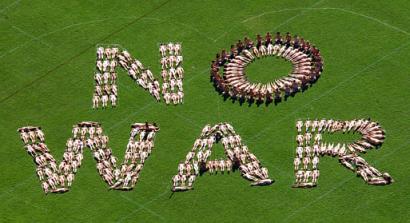
300 Australian women staging a war protest, by spelling out "No War" with their naked bodies in a Sydney sports field.
[ Politics | 2003-03-04 21:08 | | PermaLink ] More >
|
|
| Monday, March 3, 2003 |  |
|
|
|
 Westerville, Ohio is installing a 250-kilowatt fuel cell, which will power 180 homes. It is apparently the first of its kind in the U.S. It will be a 28-foot-long, 85,000-pound unit, built by FuelCell Energy of Danbury, Connecticut. As any other fuel cell, it generates energy from hydrogen by a simple chemical process. In this 'direct' approach, natural gas is the source, and the hydrogen doesn't even have to be separated out from the gas first. The unit makes little noise. Nothing is burned and it simply produces water which will be discharged directly into a city sewer. The electricity produced will still cost more than electricity produced by conventional means, but it is part of a more long term plan. As part of its Third Frontier initiative, Ohio plans to spend $103 million on fuel-cell research during the next three years. Westerville, Ohio is installing a 250-kilowatt fuel cell, which will power 180 homes. It is apparently the first of its kind in the U.S. It will be a 28-foot-long, 85,000-pound unit, built by FuelCell Energy of Danbury, Connecticut. As any other fuel cell, it generates energy from hydrogen by a simple chemical process. In this 'direct' approach, natural gas is the source, and the hydrogen doesn't even have to be separated out from the gas first. The unit makes little noise. Nothing is burned and it simply produces water which will be discharged directly into a city sewer. The electricity produced will still cost more than electricity produced by conventional means, but it is part of a more long term plan. As part of its Third Frontier initiative, Ohio plans to spend $103 million on fuel-cell research during the next three years.
[ Technology | 2003-03-03 23:59 | | PermaLink ] More >
|
|
|
|
 Zope seems to be popping up in front of me more frequently recently. Zope is an ingenious, unique, dynamic, modular, web-based software environment written in the Python language. I've had it running on my server since several years, and for a while back then I was really gung ho about it, and was planning on doing all my development in Zope. There's lots of ready-made freely available modules for Zope that very easily makes it do lots of useful things, without any real programming. But when I tried to implement one of my own projects from scratch in Zope I ended up so thoroughly frustrated that I gave the whole thing up. Well, what frustrated me so deeply was the DTML scripting language, which seemed to stop me from doing even the simplest things I wanted to do, for no good reason. I understand things have changed greatly and there are new versions and new frameworks for how to do things, which all sounds exciting. So maybe I should explore that world again. Zope 3's 'Component Architecture' sounds very compelling. I was today looking at a couple of weblogs by prominent Zope people. Jeffrey Shell is a programmer responsible for some key pieces of Zope. Paul Everitt is the former CEO of DigiCool, the company that develops the core of Zope. Zope seems to be popping up in front of me more frequently recently. Zope is an ingenious, unique, dynamic, modular, web-based software environment written in the Python language. I've had it running on my server since several years, and for a while back then I was really gung ho about it, and was planning on doing all my development in Zope. There's lots of ready-made freely available modules for Zope that very easily makes it do lots of useful things, without any real programming. But when I tried to implement one of my own projects from scratch in Zope I ended up so thoroughly frustrated that I gave the whole thing up. Well, what frustrated me so deeply was the DTML scripting language, which seemed to stop me from doing even the simplest things I wanted to do, for no good reason. I understand things have changed greatly and there are new versions and new frameworks for how to do things, which all sounds exciting. So maybe I should explore that world again. Zope 3's 'Component Architecture' sounds very compelling. I was today looking at a couple of weblogs by prominent Zope people. Jeffrey Shell is a programmer responsible for some key pieces of Zope. Paul Everitt is the former CEO of DigiCool, the company that develops the core of Zope.
[ Programming | 2003-03-03 23:59 | | PermaLink ] More >
|
|
|
|
Dan Gillmor writes:"U.S. Sen. Ron Wyden, an Oregon Democrat, has a strikingly simple idea to bolster customers' rights to freely use software, movies and music that they've paid for: Force the sellers of such products to tell the truth about the restrictions they're imposing on users.
When customers know, for example, that the compact disc they're buying is technologically rigged so they can't rip MP3 files from it for use on a portable player, they won't buy it. Eventually, these informed customers will demand change in the copyright laws..." Yep, simple and elegant. Force the manufacturers to clearly, in proper English, explain what you're buying, including the features they have painstakingly built in to make the product LESS useful to you. And the market will decide what people really want.
If the truth were always clearly visible, market economics alone would transform the world. The only reason that large numbers of people are choosing that which they don't really want is that they're being deceived.
[ Information | 2003-03-03 23:59 | | PermaLink ] More >
|
|
|
|
Rebecca Blood quotes some wise excerpts from the Federalist Papers. The founding fathers of the United States foresaw many potential pitfalls in the system they were designing. Just a shame that their design has gradually become less and less respected and adhered to by successive U.S. governments.Federalist No. 4, John Jay:
"[T]he safety of the people of America against dangers from foreign force depends not only on their forbearing to give just causes of war to other nations, but also on their placing and continuing themselves in such a situation as not to invite hostility or insult; for it need not be observed that there are pretended as well as just causes for war.
It is too true, however disgraceful it may be to human nature, that nations in general will make war whenever they have a prospect of getting anything by it; [rulers] will often make war when their nations are to get nothing by it, but for purposes and objects merely personal, such as a thirst for military glory, revenge for personal affronts, ambition, or private compacts to aggrandise and support their particular families or partisans. These and a variety of other motives, which affect only the mind of the sovereign, often lead him to engage in wars not sanctified by justice or the voice and interests of his people."
[ Politics | 2003-03-03 23:59 | | PermaLink ] More >
|
|
<< Newer stories Page: 1 ... 64 65 66 67 68 ... 97 Older stories >> |
|

This is a collage of things that catch my eye, things that need to be said, and stuff I really care about
TRUTH
BEAUTY
FREEDOM
LOVE
TECHNOLOGY
|
| Mon | Tue | Wed | Thu | Fri | Sat | Sun |
|---|
|
|
|
|
|
|
1 |
| 2 |
3 |
4 |
5 |
6 |
7 |
8 |
| 9 |
10 |
11 |
12 |
13 |
14 |
15 |
| 16 |
17 |
18 |
19 |
20 |
21 |
22 |
| 23 |
24 |
25 |
26 |
27 |
28 |
|
|




